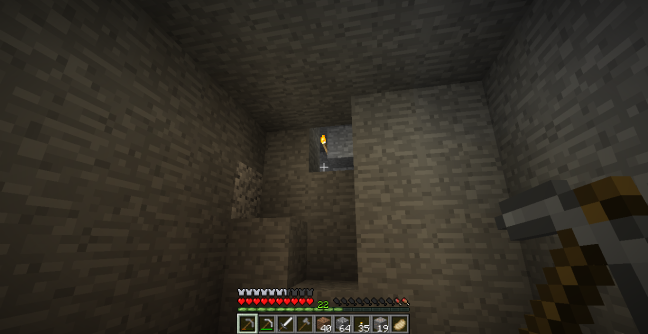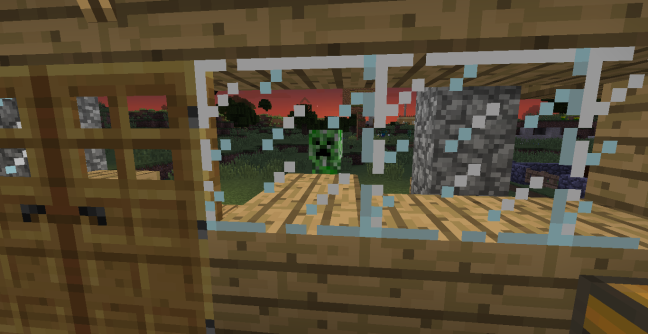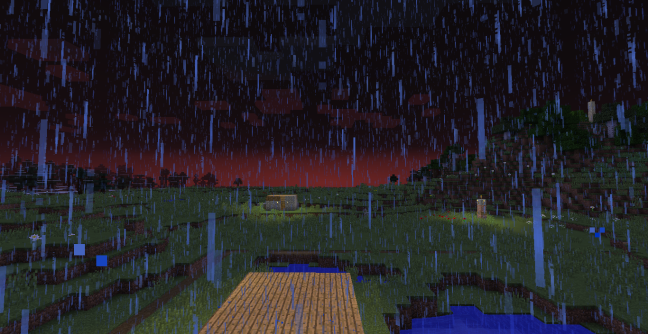If Minecraft were a foreign language, I would put myself at an A2 level – a basic command and able to function in a number of situations but still at times hampered by an inability to consistently match output to knowledge and lacking in advanced level skills.
Over the first couple of weeks of #evomc2017, I have largely stuck to playing alone. I have been taking the time to read up, relearn, reflect and experiment.Being in the position of the casual gamer trying to improve his skills has given me the cause to think about what it means to learn something and these are my thoughts so far:
P&R – Persistence and Resilience
In language education, we often talk about the importance of making mistakes. They are seen as a vital part of the learning process showing how the learner has progressed and what still needs to be worked on.
That is all true but my recent gameplay experience has acted as a strong reminder that a significant degree of perseverance, resilience and resolve is needed to work through and past those errors. The initial stages can be incredibly frustrating (as one course participant in our Google+ Community put it “I’ve respawned so many times I’ve lost count.”) They can be overwhelming. Of course mistakes will be made. The important thing in the early stages is not so much what can be learned from the mistakes but rather simply having the drive and determination to keep trying.
Making breakthroughs

It is important to show that resilience and keep that resolve when new ideas are flying at you faster than you can think because the breakthrough does come eventually. For me in this case, it was finally remembering how to make a furnace. Once I had done that, I could make torches, a vital item in the game, without having to dig for coal (which you need torches for anyway). I could smelt iron and make better items. I could cook food and keep my character healthy. Solving one simple problem had opened up the opportunity to do so many more things and that made those difficult first couple of hours of gametime worth it.
With our language learners, especially at lower levels, we need to remember that struggle and never say “why don’t they get this?” A major part of our job as language educators is to guide them to that point where they have a breakthrough that allows them to take a huge stride forward in their learning. And then,we have to help them get to the next one…
Plateaus
After the breakthrough came a rush. I found myself thinking throughout the next day what I would do when next playing to further strengthen and secure my base. The next session in-game was abuzz with a hive of activity as I collected resources and brought them back to my crafting table and furnace to make essentials for my character’s survival.
However, there soon came a point of “what next?” I had a secure base. I had all the items I needed and back-up resources to repair and replace them. Food was not an urgent issue so what now? I found myself in the position of knowing there was more to the game – more items to find, more things to construct, and more tasks to do – but I had no idea where to start.
It was a return to those feeling of frustration. I had been making great progress and now I was stuck like an adventurer with a creeper stood right outside the door, not really going anywhere and not really doing anything new. Again, this is an important element of the learning process that we should always remember as teachers – periods of progress will be followed by plateaus in development, which can be a difficult period for the learner.

Going beyond the immediate learning context
The key for me to push beyond the plateau was to step away from the gameworld and expand my knowledge of the game. I did this, as detailed in my last post, by raiding my son’s bookshelves for his official handbook, backed up by some searches online for ideas and inspiration.
I believe this is an important aspect of language learning that is often overlooked – the need for targetted self-study. Learners can make so much more progress when they conduct their own investigations. This allows them to work in a mode which suits them and personalise the content they want to focus on. The classroom environment is also key in providing a starting point and a community for learning but it has to be complemented by something more. This is where learner training and coaching come into effect. I believe that as language educators we should devote some of our class time to sharing ideas about how to find and make the most of learning opportunities beyond the classroom. That way, an element of self-sustainability can be promoted to help with passing through those plateaus.
Working together v. Striking out on your own
During my reflections, it did not escape my attention that I had spent a lot of time online sharing a virtual space with others but generally playing on my own. When stuck, there was a supportive community right there willing to help and offer guidance. Indeed, many people participating in #evomc2017 have shared thoughts on how they could not have possibly made any progress without the assistance of the more experienced players on the server.
But I hadn’t. Why not? Well, part of it stems from a personal belief that I needed to get to grips with the basics once again myself in order to truly learn them. Had I sought out help, it might have actually taken me longer to pick up the skills I needed. Of course, not everyone feels the same way and plenty of people will tell you that they feel they learn more when someone helps and guides them. It’s all simply a matter of learning preferences.
Another factor that affected my approach was that I am somewhat of an introvert when it comes to learning. I like to take time to analyse, theorise, experiment and reflect on my own before I begin to share with others. And that is another key takeaway for our classrooms – we need to respect that not everyone wants to interact and collaborate immediately. Some people prefer to observe first and join in later. Others prefer to formulate their own ideas first and share later. It’s all about working through those barriers and plateaus in a personalised way and we should always try to accommodate that.
I now feel ready to ‘declare’ as head EVO moderator Vance Stevens puts it and join other players in real time collaboration and exploration in the gameworld (and that will probably be the subject of a near future blog post).
P&RII – Plans and Reflection
And the final thought (for now at least) to come from these last two weeks of play is the importance of engaging in a reflective process. At each stage of play, from not remembering how to make basic items to digging as deep as I could go under my base to venturing out further into the gameworld to make new discoveries, a plan was always needed to get the most out of it. I now find myself, usually mentally but at times with paper and pen, planning out play sessions before I log on, making lists of items to find/make and goals to achieve. This helps my play,and therefore my learning become more focused.
And then of course comes one of the most important stages – reflection. I take time after each play session to review my plan. Which targets were reached and how? What changes did I make on the way? What proved to be out of my reach and what was simply a poor idea? How can I make even more progress next time? These are not just quesitons and thoughts fora rainy day. These are vital questions we should always be asking ourselves whether we are learning, teaching or just simply playing.




Great reflections!
LikeLiked by 1 person
Thanks!
LikeLike
Most every video game, but especially one as complicated as Minecraft involves a lot of the same learning processes you use in picking up many other skills. I’ve long wondered how someone who plays a lot of games does in other aspects of learning, as they go through the process so often, albeit usually in a much abbreviated form.
LikeLiked by 1 person
One of the great features of gaming is the option to fail. Players think nothing of backtracking a little and having another go. However, when learning in a traditional classroom environment, we do not often see the same effect. Students try, fail, and feel demoralised. I have seen English language learners who lack motivation in class willing to spend hours making a video about Minecraft just to get it right. Their love of the game overrides their concerns about producing and reproducing imperfect language.
LikeLiked by 1 person
That’s a great insight.
LikeLike